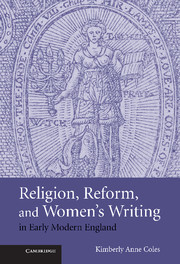Book contents
- Frontmatter
- Contents
- Acknowledgments
- Abbreviations
- Introduction: Making sects: women as reformers, writers, and subjects in Reformation England
- 1 The death of the author (and the appropriation of her text): the case of Anne Askew's Examinations
- 2 Representing the faith of a nation: transitional spirituality in the works of Katherine Parr
- 3 ‘[A] pen to paynt’: Mary Sidney Herbert and the problems of a Protestant poetics
- 4 A new jerusalem: Anne Lok's ‘Meditation’ and the lyric voice
- 5 ‘A Womans writing of diuinest things’: Aemilia Lanyer's passion for a professional poetic vocation
- Afterword
- Notes
- Index
3 - ‘[A] pen to paynt’: Mary Sidney Herbert and the problems of a Protestant poetics
Published online by Cambridge University Press: 06 July 2010
- Frontmatter
- Contents
- Acknowledgments
- Abbreviations
- Introduction: Making sects: women as reformers, writers, and subjects in Reformation England
- 1 The death of the author (and the appropriation of her text): the case of Anne Askew's Examinations
- 2 Representing the faith of a nation: transitional spirituality in the works of Katherine Parr
- 3 ‘[A] pen to paynt’: Mary Sidney Herbert and the problems of a Protestant poetics
- 4 A new jerusalem: Anne Lok's ‘Meditation’ and the lyric voice
- 5 ‘A Womans writing of diuinest things’: Aemilia Lanyer's passion for a professional poetic vocation
- Afterword
- Notes
- Index
Summary
In a theological system which drove such a wedge between grace and (fallen) nature, and thus undermined the place of secondary causes in the economy of salvation, it was difficult to establish a cogent reason for setting … great store by the pursuit of eloquence.
Richard Rex, A Reformation rhetoricPoesie is a study fit for [women's] purpose; being a wonton, ammusing, subtill, disguised, and pratling Arte; all in delight, all in shew, like to themselves.
Michel de Montaigne, ‘Of three commerces or societies’The writing of women exerted formative pressure upon not simply what it meant to be an English Protestant, but also what it meant to be an English Protestant poet. This study has thus far assessed how the figure of the religious female lent authority to the writing of women, and how, in turn, women used this authority in the arena of religious polemics. This is not to say that women were not participants in what we regard (in post-Romantic terms) as literary production. On the contrary, women were crucial agents in the development of a religious literary tradition in England. The influence of martyr narratives and private prayer upon later literary language has been widely researched and described. It is impossible to trace that influence to a single work – it is only possible to demonstrate the prominent place of certain women's works within these generic conventions.
- Type
- Chapter
- Information
- Publisher: Cambridge University PressPrint publication year: 2008



